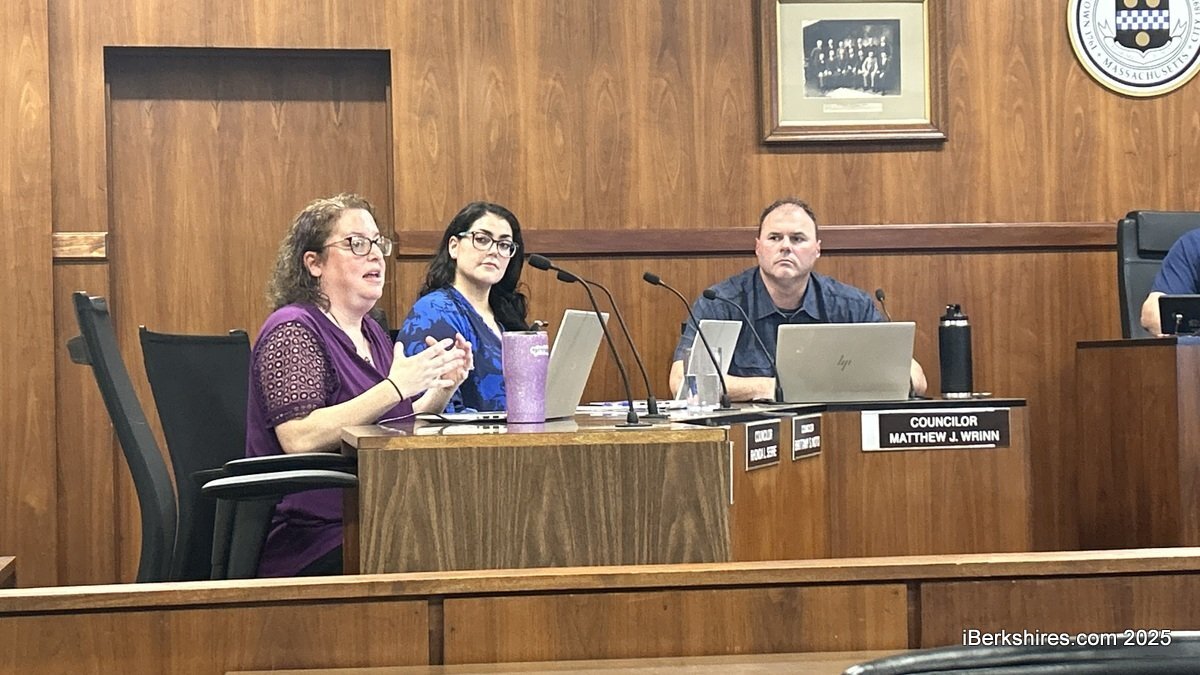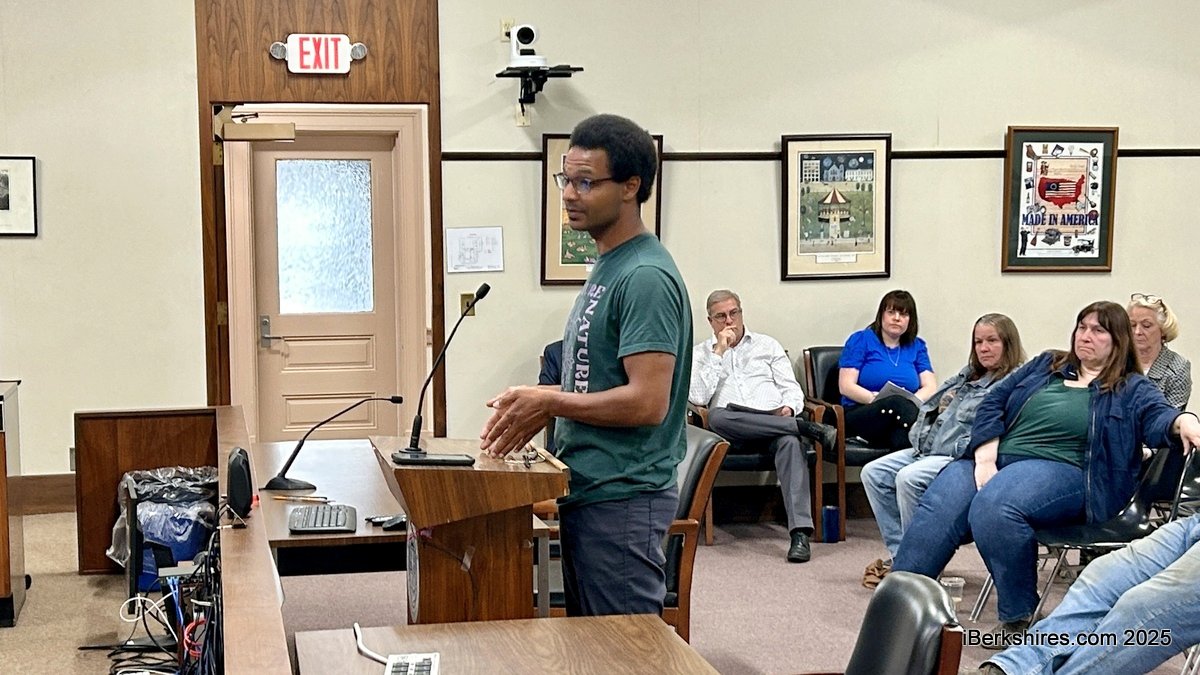Pittsfield Subcommittee Mulls Controversial 'Camping Ordinance'By Brittany Polito, iBerkshires Staff
01:10PM / Monday, June 09, 2025 | |
 City Councilors Alisa Costa, Brittany Noto, and Matthew Wrinn, members of the public health and safety subcommittee. City Councilors Alisa Costa, Brittany Noto, and Matthew Wrinn, members of the public health and safety subcommittee. |

Kameer Taliaferro, a member of the Affordable Housing Trust, says the ordinance would have a discriminatory impact.
PITTSFIELD, Mass. — A proposed ordinance to ban camping on public property has put a spotlight on housing instability in Pittsfield.
It has sparked both outrage and a drive to collaborate across sectors to come up with solutions. Both were brought to Council Chambers last Tuesday during the public health and safety subcommittee meeting.
"It's just going to have a discriminatory impact, even if it's not the intent," said Kamaar Taliaferro, a member of the Affordable Housing Trust.
"Given the racial demographics of the population of all these people, there is no way for this to not have a discriminatory impact and to not build on the instances of race-based injustice that we see in the criminal justice system."
In the 2025 Point In Time count, 95 of the 187 people surveyed identified themselves as Black, African American, or African, and 65 percent are people of color.
Taliaferro also referenced a study by the Journal of the American Medical Association that suggests encampment sweeps, bans, and move-along orders could contribute to 15-25 percent of deaths among the unsheltered population over ten years.
"Enforcement of this ordinance would likely have significant unintended consequences in the health and safety of homeless individuals. Forced displacement, as someone has spoken to earlier today, without providing safe, accessible, and supportive alternatives often exacerbates trauma, it disrupts care, and it can drive individuals further from critical health and mental health services that they may need," Brient Center President Diana Knaebe said.
"Stress and displacement can increase psychiatric symptoms, substance use, and physical health decline. From a public health perspective, banning camping or banning some ability for people to have a place to stay may reduce visibility of the homeless, but it does not address the root causes or reduce its prevalence. It could certainly drive people underground and limit access to supports, to the community, possibly causing the spread of disease, increased substance use, general poor health, and even death."
Mayor Peter Marchetti, who proposed the ordinance last month, said at the end of the meeting that the ordinance "Never has to see the day of light if we come up with a solution."
Over more than three hours, the subcommittee heard from human service, law enforcement, and city officials about homelessness in the city and the impact of this ordinance if passed. Serving as an information session, it was arranged by Councilor at Large Alisa Costa, who wanted to bring in expertise from multiple angles.
"From the moment that I saw this proposal, I sort of wanted to double down on that idea that we should be able to come together across sectors, and I've done the cross-sector work for many years, to align a little bit better. Maybe we could get a little bit better outcomes," she said.
"But I don't know if that's going to come from an ordinance or from the mayor's office. I think the mayor's office can be a wonderful tool for bringing people together, like mayor you do with the [Mental Health and Substance Use Disorder Advisory Committee], but I don't know if this is going to get us where we want to be, which is a healthier, safer community."
It was referred back to the City Council with the recommendation that criminal penalties and the three-day limit on private property camping be removed. The next day, it was discussed during the Homelessness Advisory Committee meeting VIA Zoom.
"I want to begin kind of like I did a couple weeks ago, or maybe it was just only last week, by publicly thanking Councilor Costa for slowing down the process," Marchetti said.
"I appreciate the conversations that her and I have had offline regarding this, and there are some modifications to the camping ordinance that have come from that, and I also want to thank many members in the audience tonight who have lent their voice to a civil, peaceful conversation about a very serious problem that needs to be addressed one way or another."
He prepared a presentation that explains the ordinance aims to codify existing park rules, expand regulations to additional public spaces, maintain public health and safety conditions, and open a dialogue about struggles the community is currently facing.
"The city spent $20,801.77 to hire a team of vendors to clean up a large encampment at Springside Park. That was just for one encampment, and it was at the beginning of 2024, so this isn't the year of cost. This was for one encampment that was in Springside Park," he reported.
"The cleanup was removal of contamination of trash and debris, removal of the bio waste that was there, the rodent pest control issue and we all know that when rats can't find food, they go looking for other resources and so as we cleaned up that, they move themselves into the neighborhoods."
The Parks Department has handled encampments with non-punitive, conversational enforcement for the last several years. Parks, Open Space, and Natural Resources Manager James McGrath explained that "At the end of the day, we want to protect the resource, but our resources are nothing if not for the people that use them."
"When we do find out that it can exist in a park in public open space, we try to prioritize making contact, and we always go in as a team, just for safety purposes, and our first approach simply is to make contact, introduce ourselves, say hello, and just try to understand better what their needs are at the present moment," he said.
"Our approach, I think, is kind of unique in that we were never there to deliver a message on day one that you have to leave. It's conversational. It's getting to know what, if they want to share, what their journey has been like, what's brought them into the park and and then we simply try to help them. Every encounter is unique. Every individual brings a different perspective of why they're there and but our job is simply to make certain that A. that they're safe, and we also want to set eyes on the property which we are charged with protecting."
Prior to this spring, the police were rarely involved. They now work with the Pittsfield Police Department's co-responders, who are trained in social work.
"We were handling this even though we're not social workers. We care about the parks. We care about the individuals. We're not making judgments. We just want to find out what's going on, how we can connect them to services, and then help them, whatever the next part of their journey is, how can we help you move on," McGrath explained.
"… We're sort of testing a new approach to it, but it always is, and as long as I'm involved in the work of addressing homelessness in parks, it will always be done with sensitivity."
Marchetti said the city is committed to maintaining this practice.
"Even if this ordinance is passed, nothing will change from the process that we've already had in place, where city staff go out, try to have conversations with the individuals, offer the resources," he said.
"There are two printed materials that we provide to folks about where the resources are and where they can go, and then also provide notice that they will need to move their tent belongings within a certain period of time."
Pittsfield Police Lt. Cheryl Callahan, who oversees the co-responder program, said that the department knows who the "problem people" are and that those people are no longer in the community.
"Many of them have full-time jobs, they just don't have a place to live. The people that are creating problems, such as one person lighting the fire of somebody else's property because they have beef, they are known to us. We deal with them all the time, constantly. Those are the people that aren't doing this. Those are the people who are just being disruptive and disturbing the downtown area, but people who are staying in tents anywhere in the city, they're not those same people," she said.
"… Do we go on many calls? Sure, we go on overdose calls. They may or may not be homeless, but homelessness doesn't mean substance abuse and alcohol addicted, and it also doesn't mean mental health."
Director of the Berkshire Athenaeum Alex Reczkowski, responding to comments that people feel unsafe at the library because unsheltered people frequent it, explained that he walked a shopping cart back to Big Y at 11 p.m. the previous night with no trouble.
"The library has a vision of welcoming everyone. The library has a mission of connecting people and resources and ideas to enrich lives and inspire lifelong learning, and strengthen our community. That's for everybody. That's what I hope we would want for everybody to do," he said, explaining that when there is bad behavior at the library, those people are not allowed back.
"… When I've seen fighting or violence, it's just like families. Folks who have unstable housing, they're living together, they don't always get along, just like we don't always get along, but that has not been taken out on library staff. It hasn't been taken out on people they didn't know."
He reminded the subcommittee that the conversation about health and safety applies to everyone.
"People come to the library. Some people who maybe make you feel unsafe come because that is one of the few places they can stay," he said.
Erin Forbush, director of shelter and housing at ServiceNet, said the intent of the ordinance was not to disrespect anyone, "But the message is disrespectful." She pointed out that these folks likely have endured generational trauma and poverty, and this adds to it.
She hopes that the ordinance creates a bigger discussion about understanding what goes on in people's lives when they are unsheltered.
"I want to be really clear, people aren't choosing this. This may seem as the only option for them, to be camping outside. Do I want anybody to be outside camping, and that's where they have to live? No, absolutely I do not, but at the same time, I also don't have housing," she said.
"We do our best. We know all the housing programs, we have landlord connections, but the amount of money that it's costing to get housing today for any of us, not just for the folks I'm serving, is not in line with what people can make."
Forbush also pointed to working with unhoused individuals whom many work alongside. This is also referred to as "invisible homelessness," and "Those are the people that if we keep pushing this, to be invisible, can't help those individuals."
"From my perspective, they deserve more than a tent," said Julie MacDonald, program director of Living In Recovery.
"They deserve to be able to have a better life, and so we have to begin looking at what it is — not just do we need more apartments, but do we need different types of services available?"
|

